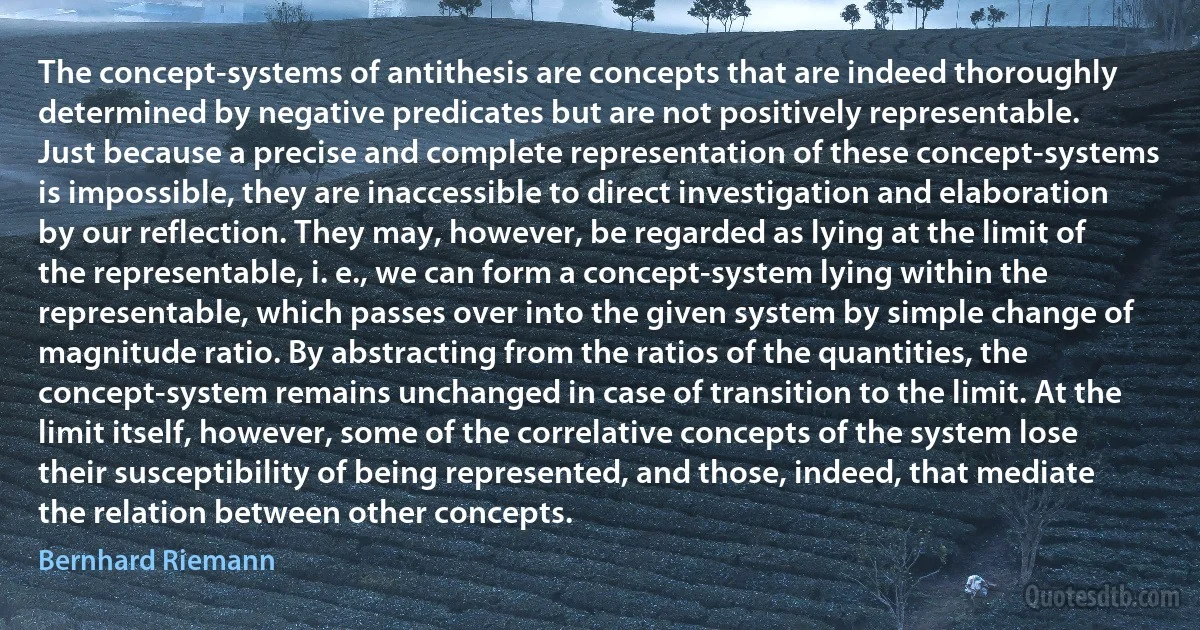
The concept-systems of antithesis are concepts that are indeed thoroughly determined by negative predicates but are not positively representable. Just because a precise and complete representation of these concept-systems is impossible, they are inaccessible to direct investigation and elaboration by our reflection. They may, however, be regarded as lying at the limit of the representable, i. e., we can form a concept-system lying within the representable, which passes over into the given system by simple change of magnitude ratio. By abstracting from the ratios of the quantities, the concept-system remains unchanged in case of transition to the limit. At the limit itself, however, some of the correlative concepts of the system lose their susceptibility of being represented, and those, indeed, that mediate the relation between other concepts.
Bernhard RiemannRelated topics
antithesis case change correlative elaboration form given impossible inaccessible lying lose magnitude ratio reflection representation simple susceptibility transition remainsRelated quotes
The statement is so frequently made that the differential calculus deals with continuous magnitude, and yet an explanation of this continuity is nowhere given; even the most rigorous expositions of the differential calculus do not base their proofs upon continuity but, with more or less consciousness of the fact, they either appeal to geometric notions or those suggested by geometry, or depend upon theorems which are never established in a purely arithmetic manner. Among these, for example, belongs the above mentioned theorem, and a more careful investigation convinced me that this theorem, or any one equivalent to it, can be regarded in some way as a sufficient basis for infinitesimal analysis. It then only remained to discover its true origin in the elements of arithmetic and thus at the same time to secure a real definition of the essence of continuity. I succeeded Nov. 24, 1858.

Richard Dedekind
Bukharin, like Lenin, regarded the system of basing economic life on mass terror not as a transient necessity but as a permanent principle of socialist organization. He did not shrink from justifying all means of coercion and held, like Trotsky at the same period, that the new system called essentially for the militarization of labour – i.e. the use of police and military force to compel the whole population to work in such places and conditions as the state might arbitrarily decree. Indeed, once the market is abolished there is no longer any free sale of labour or competition between workers, and police coercion is therefore the only means of allocating "human resources”. If hired labour is eliminated, only compulsory labour remains. In other words, socialism – as conceived by both Trotsky and Bukharin at this time – is a permanent, nation-wide labour camp. (pg. 28-9)

Leszek Kołakowski
We are seeking to build up in this country a system of society in which there shall be freedom from want. We are seeking to join with others in extending that freedom from want all over the world, but we also seek to give to all peoples freedom from fear. The freedom from fear of war is not yet lifted from the men and women of the world. We are doing our utmost to make the United Nations Organization the instrument for banishing the fear of war from the world. But there are many countries to-day where there are other fears that oppress. Personal freedom is still far from complete in many countries. Freedom of conscience is still denied to many. Freedom of speech and freedom of the Press are still unknown in most areas of the world. A system of society that denies all of these other freedoms is not socialism, but only a form of collectivism.

Clement Attlee
The economic betterment of a nation which is at a low level of intelligence and culture, or in which the population is small in relation to the extent and productivity of its territory, is best accomplished through free trade with highly cultivated, rich, and industrious nations. In the case of such a country every restriction of trade, intended to plant manufacturing industry within its borders, is premature and injurious, not only to the welfare of mankind in general, but to the progress of the nation itself. Only when the intellectual, political, and economic education of the nation has so far advanced as a result of free trade that its further progress would be checked and hindered by the import of foreign manufactures and the lack of a sufficient market for its own goods, can protective measures be justified.

Friedrich List
There seems to be a direct and formal design on foot, to enslave all America. This, however, must be done by degrees. The first step that is intended, seems to be an entire subversion of the whole system of our fathers, by the introduction of the canon and feudal law into America. The canon and feudal systems, though greatly mutilated in England, are not yet destroyed. Like the temples and palaces in which the great contrivers of them once worshipped and inhabited, they exist in ruins; and much of the domineering spirit of them still remains. The designs and labors of a certain society, to introduce the former of them into America, have been well exposed to the public by a writer of great abilities; and the further attempts to the same purpose, that may be made by that society, or by the ministry or parliament, I leave to the conjectures of the thoughtful.

John Adams
